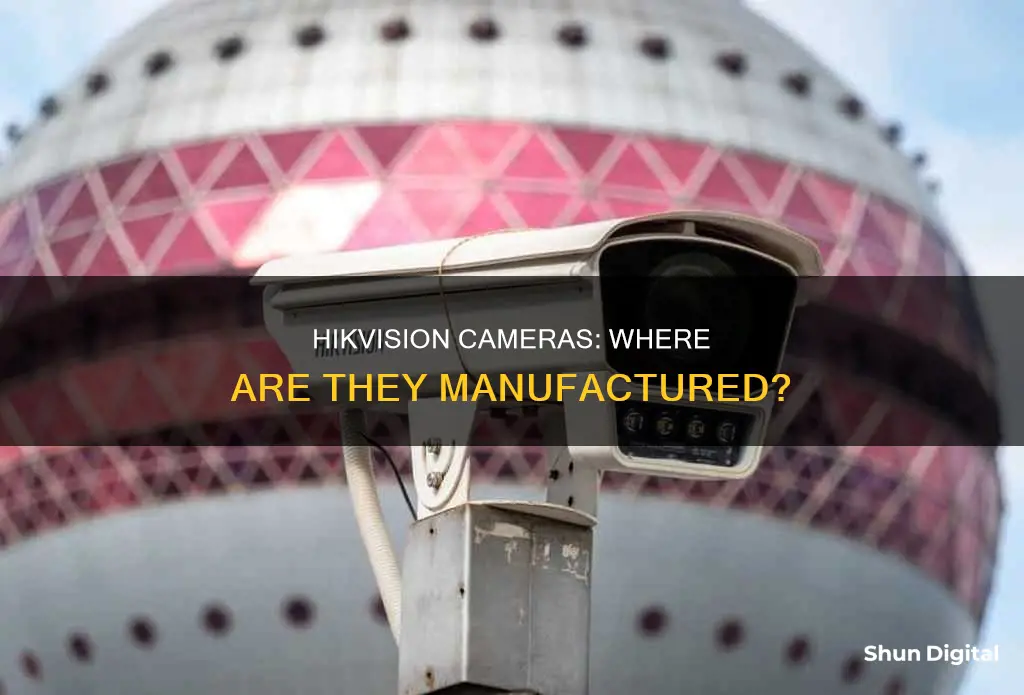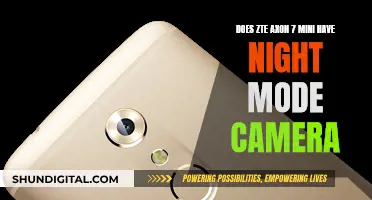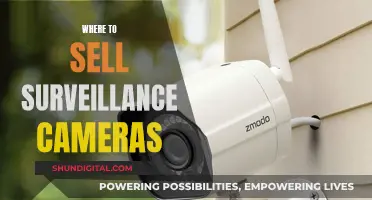
Hangzhou Hikvision Digital Technology Co., Ltd., commonly known as Hikvision, is a Chinese state-owned manufacturer and supplier of video surveillance equipment. The company was founded in 2001 and has since become one of the world's largest suppliers of video surveillance equipment, with products deployed in over 150 countries. Hikvision is headquartered in Hangzhou, Zhejiang, and listed on the Shenzhen Stock Exchange. It has a vast research and development team, investing over 10% of its annual sales revenue into continued product innovation. The company has faced sanctions and bans from several countries, including the US, UK, and India, due to its alleged involvement in mass surveillance and human rights violations.
| Characteristics | Values |
|---|---|
| Company Name | Hangzhou Hikvision Digital Technology Co., Ltd. |
| Type of Company | Chinese state-owned manufacturer and supplier of video surveillance equipment |
| Year Founded | 2001 |
| Headquarters | Hangzhou, Zhejiang, China |
| Stock Exchange | Shenzhen Stock Exchange |
| Number of Employees | 42,000 |
| Number of R&D Engineers | 20,000 |
| Annual R&D Investment | Over 10% of annual sales revenue |
| Products | Security cameras, IP cameras, HD CCTV cameras, camera systems, video recorders, access control, accessories, box cameras, bullet cameras, dome cameras, fisheye cameras, pinhole cameras, PTZ cameras, turret cameras, indoor cameras |
| Product Deployment | Over 180 countries |
| Number of Subsidiaries and Branch Offices Outside China | 80 |
What You'll Learn

Hangzhou Hikvision Digital Technology
Hikvision has grown from a former Chinese government research institute into a US$39 billion global leader in video surveillance, with products deployed in over 180 countries. The company has a vast research and development team, investing over 10% of its annual sales revenue into R&D for continued product innovation. It specializes in IP and HD-TVI technologies, offering all-inclusive box video recorders that eliminate the need for additional server costs.
Hikvision provides a wide range of physical security products, including video security, access control, and alarm systems. The company also offers integrated security solutions powered by artificial intelligence, serving various industries such as smart cities, transportation, retail, logistics, energy, and education. Its products include security cameras, video recorders, face recognition terminals, fingerprint terminals, and intelligent vertical solutions.
The company has faced controversy and sanctions due to its alleged involvement in mass surveillance, such as the monitoring of Uyghurs in Xinjiang internment camps, and national security concerns. Despite this, Hikvision has established a vast global presence and continues to expand its business into new areas.
Understanding Drive Mode in Action Cameras
You may want to see also

Surveillance in China
Hangzhou Hikvision Digital Technology Co., Ltd., commonly referred to as Hikvision, is a Chinese state-owned manufacturer and supplier of video surveillance equipment for civilian and military purposes. It is headquartered in Hangzhou, Zhejiang, and has been listed on the Shenzhen Stock Exchange since 2010.
Hikvision has been a key contributor to China's mass surveillance system, supplying equipment to hundreds of government-led surveillance projects in major cities, including Shanghai, Hangzhou, and Urumqi. The company's products are used in over 150 countries and regions globally, including the United States and the United Kingdom.
China's surveillance market has been expanding rapidly, driven by increasing demand for security cameras. In 2017, the country's professional video surveillance equipment market accounted for 44% of global revenue, growing by 14.7% compared to the previous year. This boom in surveillance has been accompanied by the development of projects such as the Skynet Project and the Sharp Eye Project, which aim to monitor public spaces in both urban and rural areas across China.
Hikvision's role in this expanding surveillance network has drawn scrutiny and criticism from various governments and human rights organisations. Due to its alleged involvement in the mass surveillance of Uyghurs and other ethnic and religious minorities in Xinjiang, as well as concerns about human rights violations, Hikvision has faced sanctions and bans from the United States, European Union, India, the United Kingdom, New Zealand, Australia, and other countries. The company has denied these allegations and challenged the imposition of restrictions.
Reviving Camera Batteries: Simple Tricks to Try
You may want to see also

Hikvision's global presence
Hangzhou Hikvision Digital Technology Co., Ltd., commonly referred to as Hikvision, is a Chinese state-owned manufacturer and supplier of video surveillance equipment for civilian and military purposes. It was founded in 2001 and has since become one of the world's largest suppliers of video surveillance equipment, with a presence in over 150 countries and regions globally.
To ensure quick responses to customer needs, Hikvision has established an extensive marketing network with 80 subsidiaries and branch offices outside mainland China. The company's commitment to research and development, with a vast team of R&D engineers, has contributed to its global expansion.
Hikvision's products are used in various industries, including smart cities, transportation, retail, logistics, energy, and education. The company's cutting-edge technologies in machine perception, artificial intelligence, and big data have made it a leader in the video surveillance market.
Despite its global presence, Hikvision has faced sanctions and bans in several countries due to concerns over human rights violations, national security, and data privacy. The United States, European countries, India, Australia, New Zealand, Ukraine, and Taiwan have all taken actions against the company, including banning the use of Hikvision equipment in government institutions and military applications.
Mastering Camera Projection in Modo: A Step-by-Step Guide
You may want to see also

Cybersecurity vulnerabilities
Hangzhou Hikvision Digital Technology Co., Ltd., often shortened to Hikvision, is a Chinese state-owned manufacturer and supplier of video surveillance equipment for civilian and military purposes. The company has been placed under sanctions from the U.S. and European governments due to its involvement in the mass surveillance of Uyghurs and other ethnic and religious minorities in Xinjiang, as well as national security concerns.
Regarding cybersecurity vulnerabilities, Hikvision cameras have been affected by several issues:
- In May 2017, seven series of Hikvision cameras were vulnerable to an improper authentication issue. If exploited, this could have allowed attackers to escalate privileges, assume the identity of authenticated users, and access sensitive data.
- In May 2021, Italian public broadcaster RAI reported that Hikvision cameras automatically opened communication channels with addresses registered in China when connected to the internet.
- In September 2021, Hikvision announced a critical command injection vulnerability (CVE-2021-36260) affecting dozens of camera models. This vulnerability allowed remote hijacking of the cameras without requiring authentication. Despite a firmware update being released, tens of thousands of systems have still not applied the security patch, leaving them vulnerable to exploitation.
- In November 2023, Hikvision issued a patch to fix a vulnerability (CVE-2023-28811) in its NVRs/DVRs.
- In addition to these specific incidents, Hikvision cameras have also been found to have weak default passwords and have been implicated in broader cybersecurity concerns due to their connection with the Chinese government.
Understanding Camera's Log Mode: Visualizing Dynamic Range
You may want to see also

Human rights concerns
Hangzhou Hikvision Digital Technology Co., Ltd., often shortened to Hikvision, is a Chinese state-owned manufacturer and supplier of video surveillance equipment for civilian and military purposes. The company has been placed under sanctions from the U.S. and European governments due to its alleged involvement in mass surveillance of Uyghurs, the Xinjiang internment camps, and national security concerns.
Involvement in Human Rights Abuses
Hikvision has been accused of involvement in human rights abuses, particularly in the Xinjiang region of China. The company has been implicated in the surveillance of ethnic Uyghurs and other minority groups, with their technology being used in internment camps and for tracking "key people". In 2021, IPVM, a physical security technology research company, exposed evidence of Hikvision's participation in Xinjiang surveillance projects, including the use of their cameras in concentration camps. In response to these allegations, the U.S. government added Hikvision to its 'entity list', effectively banning U.S. companies from selling to them.
Response to Accusations
Hikvision has denied the accusations of human rights abuses and claimed that they respect human rights and take their responsibility to protect people seriously. They have hired a former U.S. ambassador, Pierre-Richard Prosper, to advise the company on human rights compliance and have also engaged in lobbying efforts to improve their standing with the U.S. government. However, a report by a law firm hired by Hikvision concluded that while the company may not have "knowingly or intentionally" committed human rights abuses, they were aware of the nature of the projects they were involved in.
Impact of Sanctions
The sanctions and bans on Hikvision have had a significant impact on the company's business and operations. They have faced sales challenges and increased scrutiny in the Western world, particularly in Europe and the U.K. Several countries, including the U.S., India, Australia, New Zealand, and Ukraine, have banned or restricted the use of Hikvision equipment in government buildings and military installations. Additionally, some U.S. companies have stopped selling Hikvision products due to concerns about the company's involvement in human rights abuses.
Global Reactions
The reactions to the human rights concerns surrounding Hikvision have been mixed. While some countries have taken a strong stance against the company, others have continued to use their products. For example, the U.K. initially hesitated to issue an outright ban but eventually prohibited the use of Hikvision equipment in government buildings. On the other hand, Hikvision cameras are still prevalent in the public and private sectors in Britain, particularly at the local level, with an estimated 1.3 million cameras in operation.
Ongoing Developments
The situation regarding Hikvision and human rights concerns is ongoing, with new developments and responses emerging periodically. As Hikvision continues to operate and expand its business globally, the debate over the ethical implications of their involvement in surveillance and human rights abuses will likely remain a significant issue for governments, businesses, and human rights advocates worldwide.
Camera Battery Leak: What You Need to Know
You may want to see also
Frequently asked questions
Hangzhou, China.
Hangzhou Hikvision Digital Technology Co., Ltd., which is Chinese state-owned.
Hikvision makes a range of security cameras, including IP cameras, HD CCTV cameras, box cameras, bullet cameras, dome cameras, fisheye cameras, pinhole cameras, PTZ cameras, and indoor cameras.
Hikvision specializes in IP and HD-TVI technologies and their all-inclusive box video recorders mean that a Windows operating system license is no longer necessary, reducing costs.
Hikvision cameras are used in over 150 countries and regions globally, including the US, the UK, and China.







